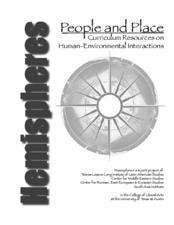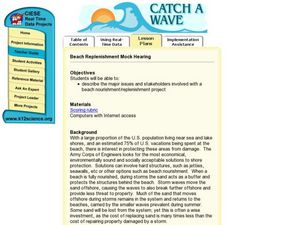Judicial Learning Center
Why Study Landmark Cases?
Why study landmark Supreme court cases? A helpful lesson offers a brief but valuable argument for the importance of these cases in the field of criminology. It introduces scholars to some key terms necessary for studying court cases and...
Judicial Learning Center
State Courts vs. Federal Courts
Popular culture often portrays the Feds as the most fearsome of law enforcement agencies. Yet, someone charged with a crime is considerably more likely to end up in a state court. The lesson, one of six covering the Organization of the...
Sharp School
The Bill of Rights and Supreme Court Cases Project
Social media and United States history combine as your young historians design a Facebook page for two major defendants of landmark Supreme Court cases. The resource includes a detailed rubric for research and page design, as well as a...
Judicial Learning Center
Your 1st Amendment Rights
Why should classes care about the First Amendment? An engaging lesson serves as a powerful tool for answering just that. As all four cases in the lesson relate directly to freedom of expression in schools, young scholars explore the...
Judicial Learning Center
Your 4th Amendment Rights
Americans love to learn about their rights, especially those that protect them from the government's power to invade their privacy. Young people are especially engaged by this topic. An informative lesson explores four Supreme Court...
Judicial Learning Center
Civil Rights and Equal Protection
Almost every American is familiar with the Supreme Court case of Brown vs. Board of Education. Far fewer understand the constitutional reasoning or the wide-ranging consequences of the ruling in the field of criminology. The interesting...
Constitutional Rights Foundation
Arizona v. United States — States and Immigration Law
As part of a study of immigration law, class members read a summary of the Supreme Court case, Arizona v. United States. They then examine a series of examples and acting as federal court judges, must determine if the scenarios meet the...
Teaching for Change
A Documents-Based Lesson on the Voting Rights Act
How did the Voting Rights Act affect the daily lives of American citizens? A document-based lesson plan developed by the Student Non-Violent Coordinating committee (SNCC) presents a case study of the impact of the Voting Rights Act of...
Council for Economic Education
Satisfaction Please! (Part 3)
Understanding the US government's role proves very important in the American economy, especially for consumers. Scholars learn about how varying government agencies help them when facing an issue. The third and final resource in the...
Curated OER
The Juvenile Death Penalty
Sensitive material is discussed in this lesson. Please review to ensure that the content is suitable for your class. The topic is the Eighth Amendment and how the U.S. Supreme Court makes determinations about what constitutes cruel and...
Administrative Office of the US Courts
Elonis v. U.S.
With the explosion of social media sites, with online threats and cyber bullying, issues of freedom of speech have taken on a whole new aspect. Elonis v. U.S. represents the first time the Supreme Court has considered whether or not...
Judicial Learning Center
Getting Ready for Trial
A courtroom can be a scary place for the uninitiated. Get familiar with the process using a helpful overview of the activities that take place prior to both civil and criminal cases. The lesson explains the differences between civil and...
Judicial Learning Center
Judicial Independence
Most people support the idea of an independent judiciary in theory until they hear about a court case that violates their principles. An informative resource explains why the concept is important. It also provides scholars of criminology...
Curated OER
Hemispheres: People and Place
Here is an astounding series of lessons, designed for high schoolers, on environmental policy. By studying water conservation in rural India, the role of the government, and the reaction of the people, learners begin to formulate...
Curated OER
Role Playing Free Speech
Young scholars conduct research into looking at a free-speech issue. They role play the events surrounding a court case. The lesson includes guiding questions to help create context and determine areas of further study. The presentation...
Judicial Learning Center
The Players in the Courtroom
Courtrooms are complicated. In addition to the many rules, there are a number of people whose jobs are not very clear to the casual courtroom observer. With the resource, individuals identify some of these roles and review more...
Judicial Learning Center
Your Day in Court
Whether out of choice or necessity, people want to know what will happen on a typical day in court. A helpful lesson walks scholars in the field of criminology through the trial process from opening statements to the final verdict.
Curated OER
Does the Supreme Court Affect Teens?: A Survey of Court Cases
Students read and restate the Ten Amendements of the Bill of Rights. They analyze Supreme Court cases using the Bill of Rights. Students make predictions about how the Supreme Court might have deicided each case. They evaluate how the...
Curated OER
The Supreme Court: The Judicial Power of the United States
Students investigate some basic facts about the Supreme Court by examining the United States Constitution and one of the landmark cases decided by that court. The operation of the Supreme Court forms the focus of the lesson.
Curated OER
Woodrow The White House Mouse
Inauguration Day is January 20. Implement an entire week's worth of mini activities to help young historians become knowledgeable of the President's job, the executive branch, and the White House. The worksheets focus on research skills,...
Curated OER
Beach Replenishment Mock Hearing
Learners study the issues and stakeholders involved in a beach replenishment project. In this beach replenishment lesson, students study the point of views for the various stakeholders in a beach replenishment issue. Learners are...
Curated OER
Marbury v. Madison (1803)
Students examine federalism and judicial review. In this Supreme Court lesson, students examine primary documents from Marbury v. Madison and discuss the implications of the decision.
Anti-Defamation League
Exploring Solutions to Address Radical Disparity Concerns
The deaths of Michael Brown, Eric Garner, and Tamir Rice, and the protests that followed the 2014 shootings, are the focus of a current-events activity that asks class members to brainstorm and research possible strategies to address the...
Judicial Learning Center
The Appeal Process
Why doesn't the Supreme Court hear testimony from witnesses? How do they complete an entire proceeding in less than two hours? A helpful lesson guides scholars of criminology through these and other questions by explaining how appeals...

























